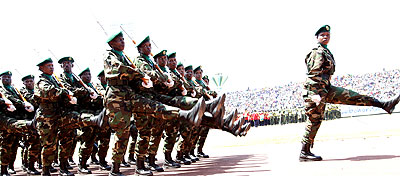Editor, Our world is troubled today and peace is threatened so often because people do not understand their neighbours. And societies up to-date still grapple with fundamental questions on how to organise themselves.


Editor,
Our world is troubled today and peace is threatened so often because people do not understand their neighbours. And societies up to-date still grapple with fundamental questions on how to organise themselves.
Rwandans are not exceptional – and indeed after the initial shock of the 1994 Genocide against the Tutsi – our past experiences are in emotional stability phase. Peace building in Rwanda is a tale of courage, determination and believing in ourselves that power comes from within.
We all know this from painful experiences through what went wrong down in our history— the colonial heritage, the 1959 ‘revolution’ to the most tragic; Genocide. Rebuilding a country from scratch is not an easy story to tell but as in a way that bends time, so long as it is remembered, it indicates a future.
The "Never Again” slogan is a challenge to Rwandan society, something that called for a bottom-up approach for the sad history to be left behind.
From the emotional trail of tears to the wonders of Rwanda’s unique culture, Rwanda has flourished through her ability to face adversity, survive, adapt, and excelled in peace building.
Rwandans have remarkably, continuously reshaped and renewed themselves to survive and attained the highest possible levels of achievements. I do commend the good governance in Rwanda generally and do highlight in particular the remarkable effort by the Peace Building Institute (PBI) and Never Again Rwanda for the increased awareness from the local levels and engaging the youth to stir critical thinking.
I believe that to attain peace, more is required than the absence of violence. We all know that the colonial heritage and the new practices of colonial administrators were not all beneficial as it was selective according to ethnicity.
The introduction of this class division categorically on identity cards unsettled the very foundation of Rwandan society resulting into resentments over time, culminating into several riots in 1959, 1963, and 1973.
This was perpetuated by bad governance at the time.
Since wars start in the minds of men, it is in the minds of men that defending of peace must be built. Our thoughts are the first things we need to deal with if we are to build sustainable peace. The transition in our minds and attitudes helped us to change and learn to adapt.
In the process of conflict transformation and peace building, the presence of good governance, social integration and economic development are all important in healing a scratched society that Rwanda was at the time.
For Rwandans to live in peace there must be unity; and the driving force behind forging of national unity and shared identity is the government of a nation built on shared past and invented traditions.
David Nkusi, Rwanda
Reaction to the story, "Rwanda is building foundation for peace, prosperity – Obama” (The New Times, July 1)


